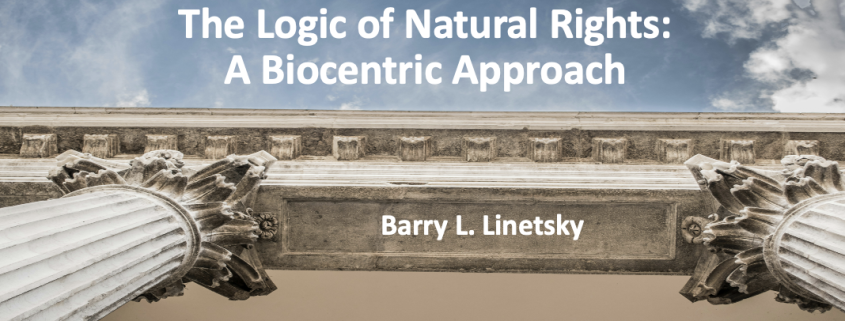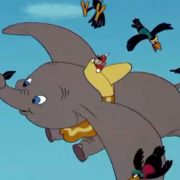The Logic of Natural Rights: A Biocentric Approach
© Barry L. Linetsky, 2025. All Rights Reserved
It was 40 years ago (1985) that I graduated from York University in Toronto with a MA degree in philosophy, having completed a combined honours BA degree in 1983 with a major in sociology and minor in philosophy. The title of my Master’s thesis was “A Biocentric Defense of Natural Rights.” The argument rested on various authoritative works by such luminaries as John Locke, David Hume, John Stuart Mill, Ludwig von Mises, F.A. Hayek, Ayn Rand, Robert Nozick, Antony Flew, and Robert Axelrod.
In cleaning out some files I recently came across a detailed two-and-a-half-page typed point-form summary of my argument written at that time. I fed that into ChatGPT with instructions to summarize my own summary. What follows below are a couple of AI generated summaries.
The general issue of natural rights remains critically important in perpetuity because it is a reasoned, principled, and objective approach to ethics and politics and is the philosophic foundation for individual rights in person and property necessary for peaceful cooperation amongst individuals.
Natural rights theory is the basis for the creation of the ratchet of life-affirming innovation with regards to health, wealth, and welfare. Ideas move the world, and as long as we remain ignorant of, or worse, actively opposed to individual freedom and responsibility with appropriate and morally justifiable social institutions to protect natural rights in the Lockean tradition, we will remain bound to the conclusion of Hobbes that power rules all and unless we give in to the subservience of dictatorial leaders, as a species we will scratch and claw our way in a daily fight for survival of all against all in a bloody state of nature in which life will remain “solitary, poor, nasty, brutish, and short.” The enlightened Scottish philosophers and America’s founding fathers rejected the Hobbes perspective as a valid understanding of a human state of nature and provided the world with the basis for what would later become a biological-centric reasoned argument premised on the need for human freedom that has proved to be the foundation for prosperous cooperative human behaviour and what we now recognize as the engine of peace and prosperity that is capitalism and is the foundation for achieving, as individuals and a species, all we most highly value.
Note that the AI summaries totally ignore the biocentric content of my thesis, likely because this perspective is mostly absent from discussion and defense of natural rights/individual rights on the Internet.
AI Generated Thesis Summary
Morality presupposes agency: only beings capable of valuing and exercising self-determined choice can be moral agents. Agency alone is necessary but insufficient; moral action also requires rationality, universality, reciprocity, and consistency. An agent’s moral status depends on meeting these conditions—those who cannot are agents but not moral agents, while those who possess but fail to exercise them remain moral agents. Moral agency confers moral rights, which are earned and inseparable from corresponding responsibilities, and claims that fail to satisfy the criteria of morality are not genuine rights. It is incoherent to assert a duty to act immorally, and infringement upon moral rights is always immoral, though not all immoral actions violate rights. Universality, reciprocity, and consistency ensure ethical principles are applied impartially, obligations are mutual, and commitments endure over time. Consequently, morality arises from the interplay of agency, rationality, and adherence to universal ethical principles, and the recognition of moral rights and responsibilities constitutes the necessary and sufficient framework for ethical conduct.
AI Generated Ultra-condensed Thesis Summary
Morality arises from agency: only beings capable of valuing and choosing freely can be moral agents. Moral action requires rationality, universality, reciprocity, and consistency, and an agent’s moral status depends on satisfying these conditions. Moral agency confers rights and corresponding responsibilities, and infringement upon these rights is inherently immoral. Ethical life therefore rests on the interplay of agency, rationality, and adherence to universal principles, which together provide the necessary and sufficient framework for moral conduct.
Barry Linetsky is CEO of Cognitive Consulting, Inc., and a retired Partner with The Strategic Planning Group in Toronto, Canada, where he and his colleagues have been helping executives and owners define and align their business purpose with customer values since 1994. Barry is the author of the acclaimed business biography The Business of Walt Disney and the Nine Principles of His Success (2017). His most recent books,Understanding and Creating Vision and Mission Statements (2020),Understanding and Creating Strategic Performance Indicators and Business Scenarios (2020), and Understanding and Creating Critical Success Factors (2021), each co-authored with Dobri Stojsic, are available from amazon. Barry’s articles have been published by Ivey Business Journal, Rotman Magazine, Mises Wire, and the Economist Intelligence Unit in conjunction with Harvard Business School. Barry is also a writer, researcher, analyst, photographer, and business strategy enabler. Read his blog and learn more at barrylinetsky.com. Follow him on Twitter @BizPhilospher.

 © 2025 Barry L. Linetsky. All Rights Reserved
© 2025 Barry L. Linetsky. All Rights Reserved



 Barry L. Linetsky, 2024. All Rights Reserved
Barry L. Linetsky, 2024. All Rights Reserved
Leave a Reply
Want to join the discussion?Feel free to contribute!